Introducing Dr. Susan Dieleman
Dr. Dieleman joined the University of Lethbridge in July 2023 as the inaugural Jarislowsky Chair in Trust and Political Leadership. Her research focuses on pragmatism, feminist philosophy, and political philosophy, and she has published widely on topics like epistemic injustice and deliberative democracy. She has taught philosophy and critical thinking courses, including applied ethics and feminist philosophy, at universities across Canada and the U.S. Dr. Dieleman is also active in several professional organizations and serves as the Secretary and Communications Director for the Richard Rorty Society. In her free time, she enjoys gardening, traveling, and volunteering.

Who is Dr. Dieleman?
Dr. Dieleman is a philosopher whose grant- and award-winning research focuses on democracy, inclusion, and progress. She is co-editor of The Ethics of Richard Rorty: Moral Communities, Self-Transformation, and Imagination (Routledge, 2022) and Pragmatism and Justice (Oxford University Press, 2017) and co-author of the Stanford Encyclopedia of Philosophy entry on Richard Rorty. She is currently writing a monograph on the topics of deliberative democracy and epistemic injustice.
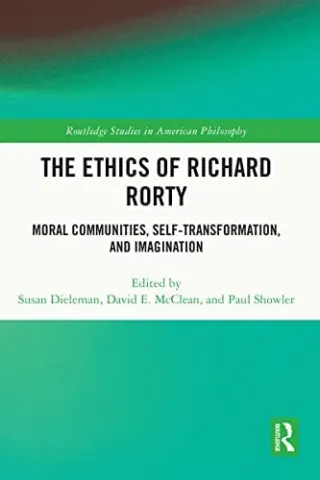
This book contains diverse and critical reflections on Richard Rorty’s contributions to ethics, an aspect of his thought that has been relatively neglected. Together, they demonstrate that Rorty offers a compelling and coherent ethical vision. The book’s chapters, grouped thematically, explore Rorty’s emphasis on the importance of moral imagination, social relations, language, and literature as instrumental for ethical self-transformation, as well as for strengthening what Rorty called “social hope,” which entails constant work toward a more democratic, inclusive, and cosmopolitan society and world. Several contributors address the ethical implications of Rorty’s commitment to a vision of political liberalism without philosophical foundations. Others offer critical examinations of Rorty’s claim that our private or individual projects of self-creation can or should be held apart from our public goals of ameliorating social conditions and reducing cruelty and suffering. Some contributors explore hurdles that impede the practical applications of certain of Rorty’s ideas. The Ethics of Richard Rorty will appeal to scholars and advanced students interested in American philosophy and ethics.
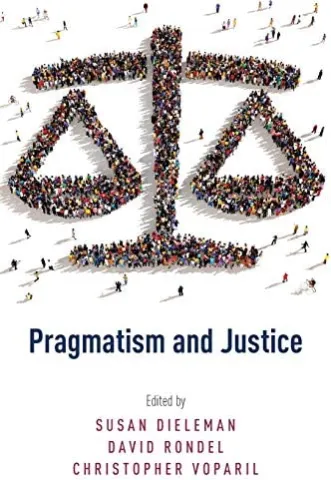
The essays in this volume answer to anxieties that the pragmatist tradition has had little to say about justice. While both the classical and neo-pragmatist traditions have produced a conspicuously small body of writing about the idea of justice, a common subtext of the essays in this volume is that there is in pragmatist thought a set of valuable resources for developing pragmatist theories of justice, for responding profitably to concrete injustices, and for engaging with contemporary, prevailing, liberal theories of justice. Despite the absence of conventionally philosophical theories of justice in the pragmatist canon, the writings of many pragmatists demonstrate an obvious sensitivity and responsiveness to injustice. Many pragmatists were and are moved by a deep sense of justice-by an awareness of the suffering of people, by the need to build just institutions, and a search for a tolerant and non-discriminatory culture that regards all people as equals. Three related and mutually reinforcing ideas to which virtually all pragmatists are committed can be discerned: a prioritization of concrete problems and real-world injustices ahead of abstract precepts; a distrust of a priori theorizing (along with a corresponding fallibilism and methodological experimentalism); and a deep and persistent pluralism, both in respect to what justice is and requires, and in respect to how real-world injustices are best recognized and remedied. Ultimately, Pragmatism and Justice asserts that pragmatism gives us powerful resources for understanding the idea of justice more clearly and responding more efficaciously to a world rife with injustice.
“Susan Dieleman, David Rondel, and Christopher Voparil have done important work in bringing together the papers included in Pragmatism and Justice. The anthology offers an overview of many of the basic methodologies, figures and contemporary issues involved in a pragmatist investigation of justice.”
“The volume makes a welcome contribution to the literature on political philosophy, providing excellent course and research material. Pragmatists should discover much that is heartening. They will encounter refreshing new takes on a myriad of pragmatist thinkers, some famous, others less familiar. And many will no doubt appreciate how the contributors have enhanced, retrieved, and brought to life the radical thrust of pragmatist thought.“
“Pragmatism and Justice, a multi-author volume, is conceptually organized and masterfully ordered, such that it reads less like a collection of disjointed essays and more like a philosophical chain novel, where each contribution picks up where the previous one left off… I recommend it to all philosophers interested in ethics, politics, or law, and those committed to resisting contemporary social injustice… this collection would work well in an upper level course on ethics and politics or as a supplement to primary works in a course on pragmatism, and I recommend it to anyone interested in theoretical reflections on justice and those aiming to resist contemporary injustices.”
“Overall, the book achieves what it sets out to do: it begins to solve the mystery of what pragmatists might be able to say about justice, and why they haven’t said much about it until now. But, more importantly, the collection also represents the beginning of an interesting research project, indicating potential areas of future work, connections with other traditions, and staking out the key positions for further debate. As such, the collection represents a resource that will be repeatedly returned to as this area of research develops.“
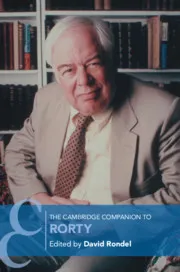
Abstract: In “Globalization, the Politics of Identity, and Social Hope,” Rorty presents a pair of claims: tinkering with the concepts of “identity” and “difference” cannot be made politically useful, but tinkering with the concepts of “rationality” and “truth” can be made politically useful. In this chapter, I use this pair of claims to explain Rorty’s reasons for thinking that leftist critics of his liberalism fail to recognize that they are themselves part of the liberal “we” to which he regularly refers. When Rorty claims that tinkering with rationality and truth can be made politically useful, he has in mind the anti-authoritarian idea that moving from philosophy to redescription makes room for social progress. When he claims that tinkering with “identity” and “difference” cannot be made politically useful, he is making two points: the politics of identity as a philosophical program is overly theoretical and overly pessimistic, but the politics of identity as a political project is nothing other than good old-fashioned liberalism. Together, these claims leave leftist philosophers and activists in a position where we cannot radically undermine liberalism, but where we can work to gradually reform it.
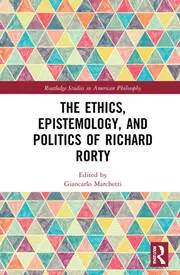
Abstract: This chapter begins by accepting Kristie Dotson’s recent claim that professional philosophy does not present diverse practitioners with livable options. This is because the profession prizes the practice of vetting contributions by measuring them against supposedly neutral and commonly-held standards for determining what counts as philosophy and what counts as not-quite philosophy. This practice tends to exclude diverse practitioners because the standards are not, it turns out, commonly-held, nor are they neutrally applied. Rather, these norms and their application are informed by unacknowledged social and political values that exclude diverse practitioners by rendering the profession hostile to them. This chapter argues that we can find, in the work of Richard Rorty, a conception of philosophy that comports well with Dotson’s demand that we reconsider our professional practices so as to make philosophy more livable for diverse practitioners. Though Rorty’s earlier work relies too heavily on the idea of a philosophical canon, his later work, in which he comes to see philosophy as cultural politics, bears striking and useful similarities to Dotson’s suggestion that we see philosophy as a culture of praxis. In short, if professional philosopher were to adopt Rorty’s suggestion that we “let a hundred flowers bloom” by seeing philosophy as cultural politics, then we could reorient those standards, norms, and practices that currently deny livable options to diverse practitioners.
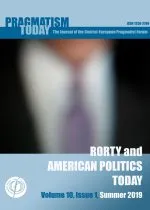
Abstract: After the 2016 election of Donald Trump, many commentators latched on to the accusations Rorty levels at the American Left in Achieving Our Country. Rorty foresaw, they claimed, that the Left’s preoccupation with cultural politics and neglect of class politics would lead to the election of a “strongman” who would take advantage of and exploit a rise in populist sentiment. In this paper, I generally agree with these readings of Rorty; he does think that the American Left has made the mistake of putting class on the political backburner. However, I suggest that this position follows from his view that economic security is vital for solidarity. Because economic security is under increasing threat in contemporary America, so too is solidarity. If greater solidarity is a goal of liberal democracy, then class politics, aimed at ending selfishness, ought to be as much a priority for the American Left as is cultural politics, aimed at ending sadism.
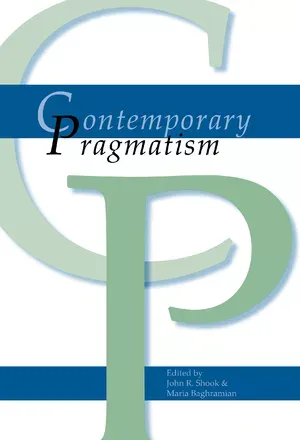
Abstract: My goal in this paper is to determine whether there exists good reason to apply to Rorty the label “deliberative democrat.” There are elements of Rorty’s work that count both for and against applying this label, which I investigate here. I conclude that, if we can conceive of a deliberative democracy that is not informed by a social epistemology that relies on Reason; if we can conceive of a deliberative democracy that has a wider view of reason and of reasons than is traditionally understood, then we can think of Rorty as a deliberativist; perhaps as a virtue deliberativist with an expansive idea of what counts a reason and what counts as a virtue.
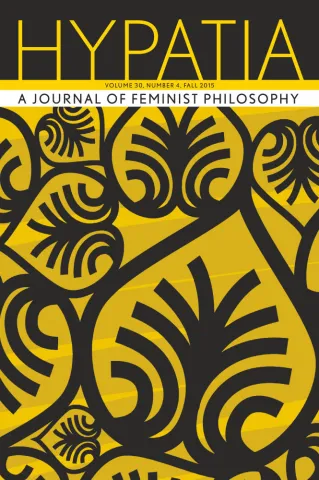
Abstract: The deliberative turn in political philosophy sees theorists attempting to ground democratic legitimacy in free, rational, and public deliberation among citizens. However, feminist theorists have criticized prominent accounts of deliberative democracy, and of the public sphere that is its site, for being too exclusionary. Iris Marion Young, Nancy Fraser, and Seyla Benhabib show that deliberative democrats generally fail to attend to substantive inclusion in their conceptions of deliberative space, even though they endorse formal inclusion. If we take these criticisms seriously, we are tasked with articulating a substantively inclusive account of deliberation. I argue in this article that enriching existing theories of deliberative democracy with Fricker’s conception of epistemic in/justice yields two specific benefits. First, it enables us to detect instances of epistemic injustice, and therefore failures of inclusion, within deliberative spaces. Second, it can act as a model for constructing deliberative spaces that are more inclusive and therefore better able to ground democratic legitimacy.
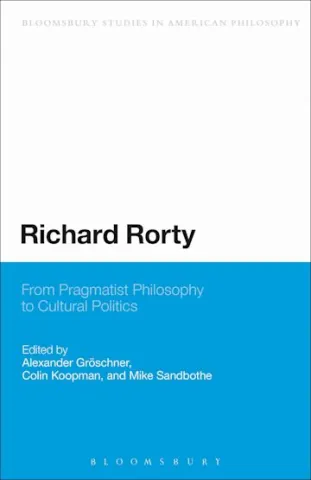
Abstract: Richard Rorty’s arguments against Habermas’s endorsement of transcendental conditions that ground successful communication, and against Putnam’s contention that there exists a limit conception of truth upon which the possibility for critique depends, speak to the very heart of his philosophical differences from the Kantian pragmatisms of these thinkers. This paper engages a feminist lens to provide a detailed exploration of the debates between Rorty and Habermas and between Rorty and Putnam. By approaching this issue from a feminist angle, the paper highlights the dissimilarities in the theoretical positions between Rorty and his interlocutors, and shows why this difference is more significant than it might initially seem. It concludes with the suggestion that Rorty’s emphasis on the radical contingency of epistemic norms can provide a basis for the kind of revolutionary social, political, and cultural change that is central to much recent feminist theory.

Dieleman, S. et al. 2019. “People are Turning to This Late American Philosopher in Troubled Times.” On CBC Ideas, produced by Tom Howell. Original Broadcast Date: December 6, 2019.
Abstract: When philosophers cross continents to do intellectual battle over the ideas of a single thinker, you know the thinker in question must really have stirred things up.
That’s definitely the case with Richard Rorty.
The late American pragmatist has been credited with predicting the rise of Donald Trump more than two decades before it happened. He’s been pilloried by enraged left-wing scholars — and almost the entire philosophy profession. He was also accused of responding to the most important human questions in history with an ironic shrug.
But he also became the most-read and, among scholars, the most-discussed U.S. philosopher of his generation. Those accusations against him were largely based on deep misunderstandings and superficial readings of his books, according to the hundred-or-so Rorty fans who gathered in Pennsylvania in November 2019.

Dieleman, S. 2023. “Episode 044.” On Podcast or Perish, hosted and produced by Cameron Graham. Original Broadcast Date: June 2, 2023.
Abstract: Dr. Susan Dieleman is the newly appointed and inaugural Jarislowsky Chair in Trust and Political Leadership at the University of Lethbridge. Dr. Dieleman is a renowned authority on the philosophy of Richard Rorty, the American pragmatist whose approach to understanding society through language and solidarity has been so instrumental in the work of many scholars in the humanities.
Contact us
Dr. Susan Dieleman (she/her)
Jarislowsky Chair in Trust and Political Leadership
Associate professor, Department of Philosophy
University of Lethbridge
Office BB70
Phone: 403-329-2786
Email: susan.dieleman@uleth.ca
